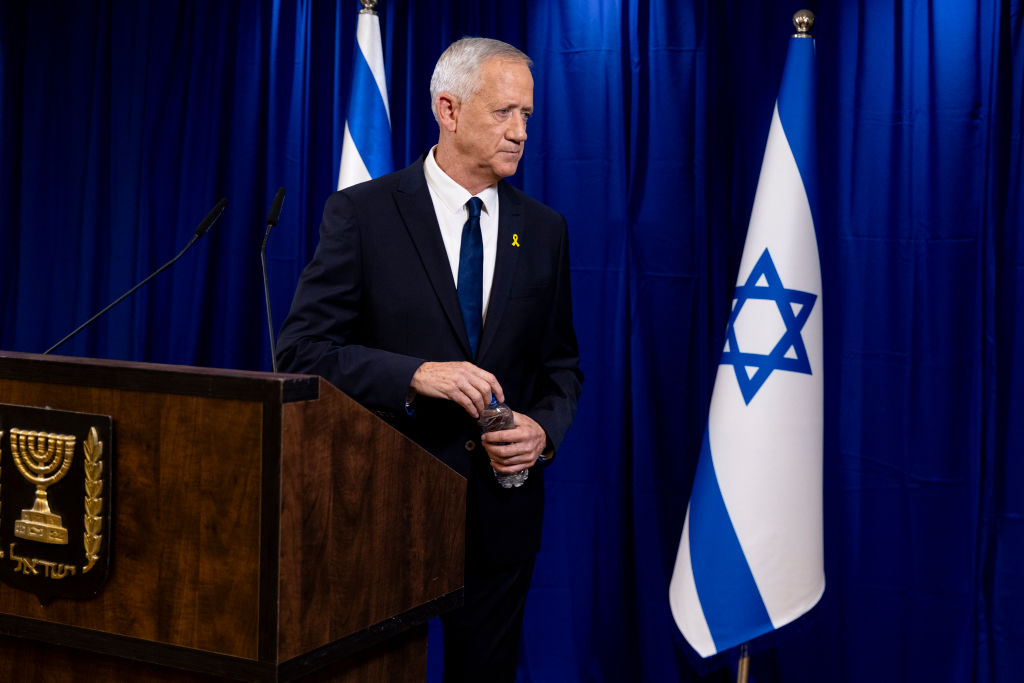Benny Gantz, leader of the Israeli Resilience Party and a member of the war cabinet, has resigned from Benjamin Netanyahu’s government. Gantz, a moderate who joined the cabinet days into the war against Hamas, has repeatedly expressed his frustration with the prime minister over a lack of a plan for Gaza.
Gantz positioned himself as a ‘patriot’, in contrast to Netanyahu, whom he accused of operating based on narrow political interests
“Netanyahu is preventing us from progressing towards a true victory,” Gantz said in a TV address on Sunday night. “For this reason we are leaving the emergency government today, with a heavy heart, yet wholeheartedly.” Gantz also called on Netanyahu to set a date for elections, adding: “Do not let our nation tear apart.”
Gantz’s decision to walk away means that he has finally followed through on his threat to resign. Gantz had previously called for progress on six key issues: the return of hostages, the destruction of Hamas militarily and politically, finding an alternative ruler for Gaza, allowing Israeli refugees from northern Israel back home after creating safer conditions for them to return, normalizing relations with Saudi Arabia, and reversing a policy that lets orthodox Jews off national service. While four Israeli hostages were rescued by Israeli forces during a raid on the Nuseirat refugee camp in the central Gaza Strip at the weekend, Gantz felt there had not been sufficient movement overall.
Gantz — a former Israeli Defense Forces chief of staff who placed the national interest above politics when he agreed to join a coalition with which he had little in common — had been expected to quit for some time. Some thought that he may eventually bow to pressure from Netanyahu, who pleaded with him to stay, out of a feeling of responsibility to the country at wartime. If Hamas had accepted the terms of the American-Israeli ceasefire deal presented by Joe Biden last week, which Gantz supports, it’s plausible that Gantz could have been persuaded to remain.
However, Gantz and his fellow party member Gadi Eisenkot, whose son was an IDF officer killed in Gaza in December, have grown increasingly frustrated by their lack of ability to influence policy. Netanyahu has constantly moved back and forth on a range of policy matters, and seems unable to balance demands from his far-right and centrist MKs (Members of the Knesset). This has led to a prolonged stalemate on urgent and critical issues, such as who will rule Gaza after Hamas. Remaining in government therefore seemed pointless.
At a press conference on Sunday — postponed from Saturday due to the successful hostage rescue operation — Gantz confirmed his resignation.
In his speech, Gantz positioned himself as a “patriot,” in contrast to Netanyahu, whom he accused of operating based on narrow political interests. Real victory, Gantz argued, cannot be achieved by military means alone. The establishment of a political alternative to Hamas is crucial, he said.
This is one of the main points of contention between the two. Netanyahu has spent the past eight months refusing to consider serious alternatives to Hamas. Not securing their demise from power could help them re-establish control when the war is over. Without real victory, warned Gantz, the terrible price paid by Israeli public will be in vain.
Gantz has also called on other members of the coalition, particularly Yoav Gallant, to “do what you think is right.” Gantz hopes that his resignation will help trigger the collapse of the coalition and lead to national elections.
Gantz and Eisenkot’s departure will leave a vacuum in the war cabinet and could allow much more influence to the government’s two ultra-nationalist ministers, Itamar Ben-Gvir and Bezalel Smotrich — neither have relevant military experience (Smotrich only did a short stint in the IDF, and Ben-Gvir was turned down by the army). Both have been pushing for irresponsible policies in Gaza and the West Bank that would undermine war efforts, damage Israel’s relations with its allies and hurt Israel’s long-term security. Both also vehemently oppose any ceasefire deal with Hamas.
Gantz’s resignation might therefore not be welcome by some of his voters. To avoid losing them, Gantz has reminded them that, unlike Netanyahu, he’ll never be guided by political calculations. “I will die for your children,” he said during the press conference.
For now, Netanyahu will remain in power, but unless he can lure in other members of the opposition, his majority in the Knesset will drop to only sixty-four seats out of a total of 120. The departure of those perceived by many Israelis as the “responsible adults” in the room, will further hurt his legitimacy.
Israelis should be very worried about this development. The future of the Israeli-Palestinian conflict will be shaped by this war. As will Israel’s relations with its neighbors. Unfortunately at the helm now is a barely-functioning prime minister who is concerned with his own political survival and two messianic figures whose views don’t represent most Israelis.
This article was originally published on The Spectator’s UK website.


























Leave a Reply